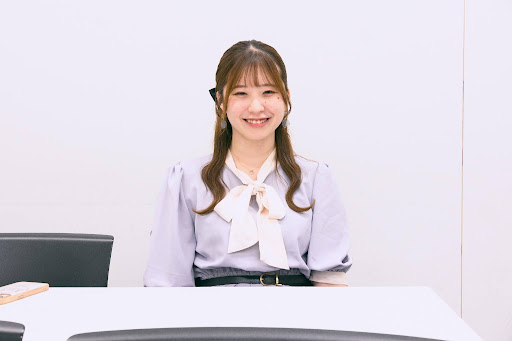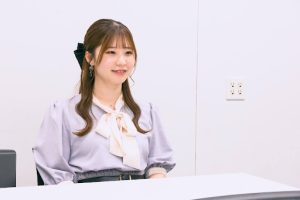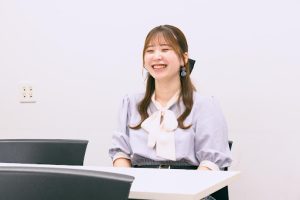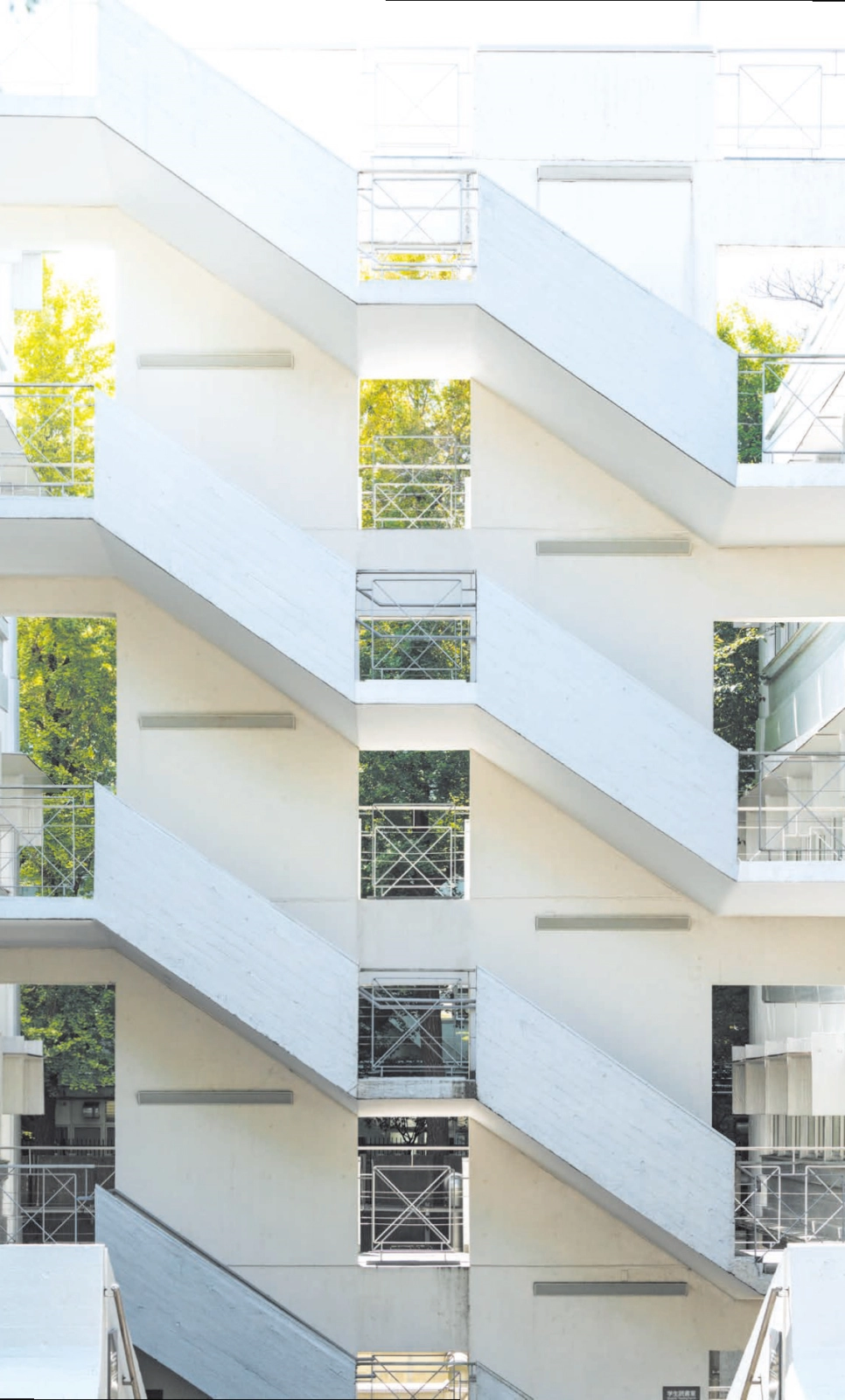The "Shinfuri" system allows students to set new goals and increases their motivation.
KIRA, Haruna
Department of Applied Mathematics
4th year

Please tell us about yourself, and how did you spend your high school years?
 “Nice to meet you, I am Haruna Kira, a fourth-year student in the Department of Applied Mathematics int the School of Fundamental Science and Engineering (FSE), Waseda University. In high school, I joined the choir club, continuing from junior high school, and served as the part leader. I devoted myself to club activities for three years, rarely missing a practice.
“Nice to meet you, I am Haruna Kira, a fourth-year student in the Department of Applied Mathematics int the School of Fundamental Science and Engineering (FSE), Waseda University. In high school, I joined the choir club, continuing from junior high school, and served as the part leader. I devoted myself to club activities for three years, rarely missing a practice.
During high school, I often felt that my friends were truly intelligent, which was a great source of inspiration and made my high school life fulfilling. I still feel the same way after entering Waseda University, and I think it’s an extremely fortunate environment for self-improvement.”
Please tell us why you chose your faculty or department.
In high school, I was interested in science subjects such as mathematics, physics, and information science, but I hadn’t decided on a specific path. FSE has a system that allows students to choose their major after the first year, so I chose it because I wanted to take my time to think about my future for a year.
Please tell us about the advantages of the department or laboratory.
Maruno Lab, where I belong, is characterized by a very open and friendly atmosphere. The professors and seniors are approachable, and there are frequent opportunities for interaction through events such as social gatherings and welcome parties. Because of this, I can easily ask questions or seek advice whenever I have any doubts or concerns. I initially thought that labs would be more intimidating, so I am very pleased with this atmosphere. I’m also looking forward to the seminar camp scheduled for the fall.
In terms of academics, the environment is very enriching. During the spring semester, we learn foundational topics through specialized books, and from the fall semester, I plan to advance my own research with an eye toward graduate school. Instead of diving into specialized topics right from the beginning, we solidify our basics in seminars where professors and graduate students also participate, allowing us to engage in research without feeling overwhelmed. This established rhythm makes it possible to pursue studies comfortably and confidently, which I find to be a major attraction.
What did you think about the “Shinfuri” system, which is a core feature of the school?
The “Shinfuri” system allows first-year students to study common foundational subjects without deciding on a department, and upon progressing to the second year, they can acquire specialized knowledge in their desired academic fields.
Firstly, I believe this system is highly beneficial for students who are unsure about their interests. By studying actively upon entering university and advancing to a field of study they find intriguing, they can discover a suitable area for themselves. Even if students have already decided on their desired field, learning foundational knowledge across all disciplines can broaden their understanding and potentially lead them to discover new interests. Consequently, this enables students to cultivate a broad perspective throughout their university life.
Moreover, I strongly feel it enhances motivation for learning. Many students in FSE may have excelled academically during their freshman year (laughs). Since advancement placement hinges on one’s academic performance, students can study with a clear goal of entering their desired field of study. Many university students often experience a decline in motivation towards studying due to the aftermath of entrance exams; however, the advancement placement system sets new goals and consequently boosts motivation.
Is there anything you are passionate about except for academics during your student life?
I am a member of the Waseda University Mixed Chorus (commonly known as “Sokon”) and strive through three weekly sessions towards regular performances, including concerts. As a part of Sokon, which boasts participation from nearly every faculty, I enjoy expanding my circle of friends to include students from various departments. Last year, I served as the soprano section leader, contributing significantly to the choir.
Additionally, I work part-time at a tutoring center, primarily teaching mathematics and English. By identifying common mistakes and areas of difficulty for students, I focus on these points to help improve their academic performance. Understanding students’ thinking processes and supporting their growth is both fascinating and a valuable opportunity for personal discovery and development for myself.
Please tell us about your future path and goals.
I aim to contribute to society using my knowledge of mathematics and other disciplines, and I intend to pursue graduate studies to enhance my expertise. For example, in the Maruno Lab where I am currently affiliated, we conduct foundational research on soliton waves with the aim of applying this knowledge to address natural disasters such as tsunamis, thereby contributing to disaster preparedness and prevention. While I have recently been assigned to the lab and have not yet engaged in specialized research, I aspire to leverage my expertise in my field of specialization to secure employment in the future and make meaningful contributions to society.
Please give a message to underclassmen and preparatory students.
 “The significant difference between learning up to university and high school lies in how directly it applies to real life. Subjects like mathematics, physics, and chemistry in high school may seem irrelevant as they often involve memorization and calculations without immediate practical applications. However, these subjects form the foundation for university education, where they are applied to real-world problems. For instance, mathematics aids in data analysis and problem-solving, while physics and chemistry contribute to research and experiments related to technology and product development.
“The significant difference between learning up to university and high school lies in how directly it applies to real life. Subjects like mathematics, physics, and chemistry in high school may seem irrelevant as they often involve memorization and calculations without immediate practical applications. However, these subjects form the foundation for university education, where they are applied to real-world problems. For instance, mathematics aids in data analysis and problem-solving, while physics and chemistry contribute to research and experiments related to technology and product development.
Moreover, university life expands beyond academics compared to high school. It allows for a wider range of activities and experiences. While university entrance exams mark a significant milestone, beyond that lies an enjoyable university experience. Embrace this opportunity to accumulate new knowledge and experiences, broadening your future possibilities. Welcome and enjoy your university life after overcoming the challenge of entrance exams.”


